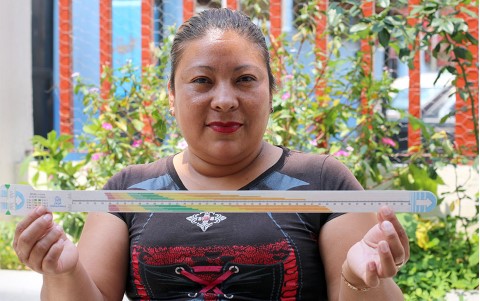
KANSAS CITY, Mo. (August 18, 2020) – Food scarcity among children and families is a growing concern in the United States and in vulnerable communities around the world. The COVID-19 pandemic only exacerbates an already dire situation. But thanks to a Kansas City-led innovation, there’s hope in the fight against global malnutrition. For the first time, a new medical breakthrough makes it possible for mothers to detect malnutrition in their children (up to age 18) early and easily, from their own homes.
Children International, a global humanitarian organization that seeks to eradicate poverty for good, has collaborated with two other Kansas City, Mo.-based organizations — Children’s Mercy and Hallmark Cards, Inc. — to globally test this innovative tool, called a mid-upper arm circumference (MUAC) z-score tape, which provides a quicker, simpler way to screen kids up to age 18 for malnutrition. The paper-made tape promises to change how pediatric malnutrition is evaluated around the world.
The effects of malnutrition among children are well documented, and accurate and timely identification of kids suffering from severe and moderate malnutrition (SAM) is essential to direct them to appropriate care. To identify and intervene in the early nutrition challenges of children, Dr. Susan Abdel-Rahman, a clinician at Children’s Mercy, conceived of the MUAC z-score tape. In partnership with Abbott Nutrition Health Institute, Children’s Mercy has, over the past year, helped scale production and distribution of the tape worldwide.

Children International piloted the device in Guatemala and India with thousands of paper-based MUAC z-score tapes designed by Hallmark Cards Inc. According to Kristen Mallory, health systems and innovation senior technical officer at Children International, the first-of-its-kind tape produced positive results in those two countries and has the potential to revolutionize the nonprofit’s nutrition assessment and treatment programs in the 10 countries where Children International operates.
“This is a phenomenal opportunity for Children International to collaborate with two leading Kansas City organizations to deliver a local innovation that will help children around the world,” Mallory said. “Malnutrition is prevalent in the global communities where Children International works, and last year 4,785 children we serve needed nutritional support. It’s critical that we identify the problem early and put children on a treatment plan.”
Information about nutritional status in children is routinely obtained from combined weight and length measurements, which require calibrated equipment, mathematical calculations and reference charts. The measurement of mid-upper arm circumference (MUAC) is also widely used to evaluate nutritional status and has proved to be a good predictor of malnutrition outcomes. However, the internationally accepted standards are static and vary by age and gender, introducing bias into the classification.
Dr. Abdel-Rahman constructed MUAC growth charts for children 2 months through 18 years of age and used the data to design the MUAC z-score tape, an inexpensive device that resembles a traditional measuring tape, but also includes age and gender specific color-coded indicators that signal the risk of malnutrition.

Dietitians for Children’s Mercy quickly adopted the MUAC z-score tape and in less than two years, hit the benchmark for evaluating 10,000 children. “The tape allows us to do a quick screening, and it’s a great tool to show the families,” said Karen Stephens, assistant director at Children’s Mercy. “It’s much easier for parents to understand when we can say ‘look, your child is in the red zone and this is why we’re concerned. It’s not just a weight change.’ They can see that their child’s body is actually decreasing or increasing.”
Hallmark, best known for its greeting cards, worked with Dr. Abdel-Rahman to implement design changes, providing time, expertise, materials and intellectual resources. Hallmark’s experts determined the best material to meet the needs of the Children International programs, ensuring the printing and cutting met quality standards for mass production of the MUAC z-score tapes.
The MUAC z-score tape is the latest example of Children International collaborating and innovating as it seeks to bring people together to end poverty for good, said Susana Eshleman, the nonprofit’s president and CEO.
“When people join forces with a shared goal to help vulnerable children, we supercharge our opportunities to create change,” Eshleman said. “Having seen the promising pilot results for the MUAC z-score tape in two of our global communities, we see a bright future for its use… a future where more children receive the critical support they need.

“We are grateful for this collaboration with Children’s Mercy and Hallmark and for the generous support of everyone involved,” she said. “MUAC z-score tapes make a better future possible for children and families in Kansas City and around the world who are at risk of lifelong health problems due to poor nutrition.”
Read Children International’s published study on the MUAC z-score pilot experiment
Children International, based in Kansas City, Missouri, USA, is a global nonprofit that delivers child and youth development programming to break generational cycles of poverty. From childhood through young adulthood, Children International empowers young people in Colombia, Ecuador, the Dominican Republic, Honduras, India, Guatemala, Mexico, the Philippines, Zambia and the United States to forge a path out of poverty through access to health care, educational support, positive role models, and the life and job skills they need to become sustainably employed. When equipped to improve their own lives, young people also transform their families and communities, for generations to come. For more information, visit children.org.
Comments
You must be logged in to comment. If you have an account, click here to log in.